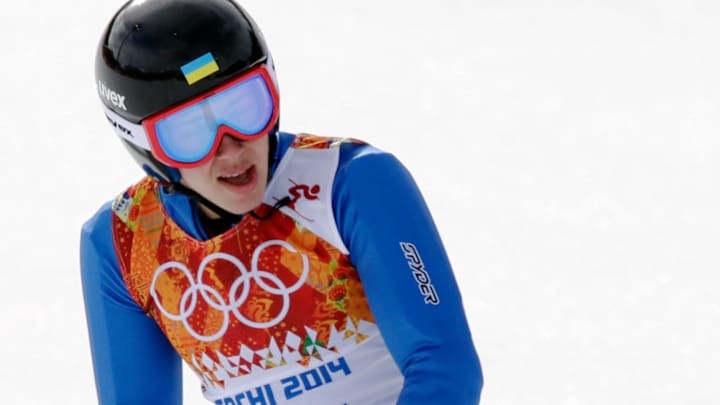Ukraine crisis felt among athletes at Olympics

SOCHI, Russia (AP) Others tried to keep it from him, but Dmytro Mytsak knew what had happened before he took to the slopes.
On a beautiful day in the snowy Caucasus Mountains, he had more to think about than his first Olympic ski race. Back home in Ukraine, his countrymen were dying in fiery clashes between police and protesters.
''I am very mad for this, but we cannot do anything really. Change the government,'' Mytsak said. ''Every time in the Olympics time, the war was stopped, even if the wars (were) between the other countries. They were stopped. And now in Ukraine, they are going mad. I don't know what to say.''
The thoughtful 18-year-old had more to say than most. He stood near the finish line Wednesday between runs of the giant slalom, talking not only about his wish for an Olympic truce, but how hard it was for his family back home.
''I am talking every day to them,'' Mytsak said. ''They said, yeah it is not that bad around in the city but in the main city it is bad because they want to clean the main street from the people, but they will not do this.''
The conflict raging little more than 600 miles from Sochi couldn't help but intrude into the games, and not just because 43 athletes from Ukraine are competing here. Ukraine is a former Soviet republic, and the close ties the current leadership has with Russia are a major part of the dispute between anti-government protesters and President Viktor Yanukovych.
Ukraine's Olympic Committee asked that its athletes be allowed to wear black armbands honoring those who died in the protest, saying on its website that it wants to ''share deep pain over the loss of fellow countrymen'' by displaying them as an ''expression of sorrow and sympathy.''
The IOC rejected that, saying it was not allowed under the Olympic Charter. And others said the focus of the Olympics should be solely on sports, despite the fighting in Kiev that left at least 25 dead.
''This is a competition,'' said Yosyf Penyak, a parallel giant slalom snowboarder from Ukraine. ''No time to talk about politics.''
Former pole vault great Sergei Bubka, who heads the Ukrainian Olympic Committee, urged both sides to put down their weapons and find a way to end the violence that he said is bringing the country to ''the brink of catastrophe.''
''All of we have families at home. This last night was very tough because we follow what's happened,'' Bubka said in Sochi. ''It happens in this moment when Olympic Games are going on, the most beautiful, and most democratic and most peaceful event. I would say everyone is really worried, everyone is really under pressure, but they would like to continue to compete to send a message home to bring to dialogue all parties.''
IOC President Thomas Bach also praised Ukrainian athletes for keeping their focus.
''The way they have continued to represent their nation with great dignity is a credit to them and their country,'' Bach said. ''Their presence here is a symbol that sport can build bridges and help to bring people from different backgrounds together in peace.''
A big part of Russian President Vladimir Putin's ambition for these Olympics has been to show off his country's geopolitical strength and post-Soviet revival. Many view his oil-rich government's economic backing for Ukraine's government as a way to exercise that influence and keep former Soviet republics in Moscow's orbit.
Outside the Olympic hockey arena, Ukrainian Igor Volkov said he was frustrated that all he can see from his Sochi hotel is Russian television, which he said gives a markedly pro-Russian view of events in Kiev and paints the protesters as the main cause of the violence.
Volkov was with a childhood friend, Ruslan Alexandrovsky of Russia, illustrating the close relationship between the two countries. The two said they were rooting for Ukrainian athletes first, then Russians if the Ukrainians have all been eliminated from competition.
With these Olympics, ''Russia wants to show that it's big and wants to influence things. It is already influencing things in Ukraine, and it will probably influence things even more now'' that Putin is emerging stronger from the games, he said.
''We are for a united Ukraine,'' Volkov said. ''We don't want to end up divided like Yugoslavia, look what happened there.''
His 21-year-old daughter, Anna, born soon after the collapse of the Soviet Union, was adamant in wanting a Ukraine free of Russian pressure.
''We are children of independence,'' she said, a yellow-and-blue Ukrainian flag around her shoulders that stood out amid a sea of spectators wearing Russian flags. ''We want a free Ukraine, undivided, on the land of our ancestors.''
Mytsak, the skier, said he hopes for change in his country. But his house is there, and no matter what happens he will always come back home.
''I am sad for all the people,'' he said.
---
Associated Press writers Graham Dunbar, Eddie Pells and Stephen Wilson contributed to this report
